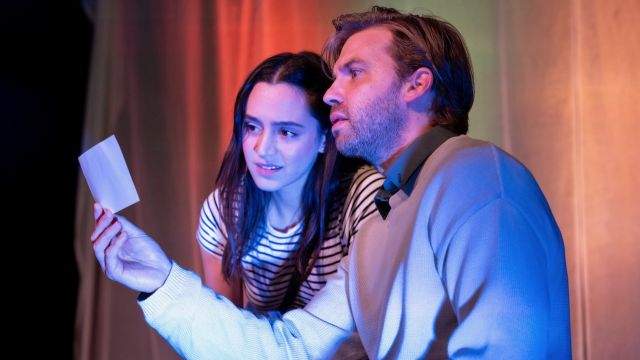The Sugar Syndrome
London-based writer, Lucy Prebble, wrote The Sugar Syndrome when she was only 20-something in 2003. She has since forged a career delving further into the themes of power and self-control – for the stage, (Enron) and screen (Secret Diary of a Call Girl, Succession). And while this play, where characters meet in chatrooms is set in the dial-up modem age, it is worth revisiting for its universal theme about longing for connection. It also provides the chance for some outstanding performances by a small cast playing four complex characters. Producers Stephanie Elliot (making her professional debut as Director) and Davis Dingle (who is also Sound Designer) have assembled a brilliant team at Brisbane’s intimate BackDock Arts theatre space. Bringing this uncomfortable story to life is a dream cast of relative newcomers from Brisbane’s rich training ground at Queensland University of Technology and Queensland Conservatorium – all talent to watch out for.

Siena D’Arienzo gives a wonderful performance as central character, 17-year-old Dani. Dani is brazen, annoying, intelligent, stupid, charming, funny, and Siena perfectly captures this confusing love/hate, sorry/not sorry hormonal soup that is the teenage brain. In a recent Guardian interview, Lucy Prebble said of her work method: “Just do it. Just trust your instinct. Then you grow in courage, which is really the only quality that matters. Courage, and kindness.” It struck me that this is Dani to a tee – she is navigating totally by instinct and it’s a gripping 90 minutes in her presence. In her search for connection, Dani (of course!) rejects her mother, played with heartbreaking nuance by Kerith Atkinson. As the most experienced performer in the cast, Kerith provides an important anchor as the older character who is also confused with her life, but not getting any attention. Her absent husband may be having an affair, and she has recently steered Dani through treatment for an eating disorder. In Dani’s aversion to all things predictable and normal, she seeks the sugar rush of instant gratification with two online meet-ups, while simultaneously self-sabotaging in a parallel of her struggle with bulimia. First is a powerplay with the virginal 22-year-old wannabe music journalist, Lewis, played by Ethan Waerea. Ethan is captivating as the dazed and confused Lewis – we can cringingly see that his future recovery from Dani’s treatment could manifest in what we now call ‘toxic masculinity’. Second, as Dani deals with her own burgeoning virulent femininity, one remedy seems to be her attraction to a ‘reformed’ paedophile, Tim. The reasoning behind the relationship is unclear but creates great dramatic tension. Is this entrapment? Will her father’s connections to the ‘red top’ tabloids come into play? Playing Tim, Tom Yaxley has the most difficult part in the quartet. Tim is a convicted paedophile who has served his time. He is trying to reform, and explains his attraction to children in terms of their innocence and untainted self-confidence, perhaps something he is trying to recapture for himself. Tom gives a measured and controlled performance that maintains our intrigue, despite the repulsiveness side to this character. Perhaps Dani is trying to ‘save’ Tim in a way that will help her save herself. But she faces a harsh lesson in growing up when the couple become too close, and Tim asks her for a very risky favour.

While this play is very much set in its time and place – London with an S-Club-7 soundtrack, and the early days of internet chatrooms – and its young writer left some parts underdeveloped and others not quite ringing true, the themes at its heart remain relevant. And her work has given us some cracking performances! As with all small, independent theatre productions, this is a solid team effort, with everyone chipping in. The sound design by Davis Dingle captures the soundtrack of the dial-up days, ‘Dad Rock’, and the looming anxiety of the piece. The stage design is a simple set of white boxes and netting, lit succinctly by Lighting Designer, Abigail Taylor, to create an internet café, a London flat, and a nightclub. Jacqui Somerville’s role as Intimacy Coordinator helps to create a believable portrayal of young sexual appetites that crave expression but lack connection. No mean feat.
I’m sure we’ll see all these names in the near future in Brisbane’s thriving indie theatre scene.
Beth Keehn
Photographer: Sean Gilligan
Find out more: www.backdockarts.com
Subscribe to our E-Newsletter, buy our latest print edition or find a Performing Arts book at Book Nook.

